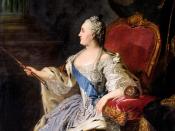In accessing the actual "greatness" attributed to Catherine the Great, Empress of Russia during the European Enlightenment, one must look at all aspects of her rule. Her outgoing personality left her to be described as anything from "terrible" to "great". She could be deceptive yet honest, humorous yet firm, and light-hearted yet wise. Thus the Enlightenment would not have been a part of Russian history if not for the determination of Catherine the Great. Catherine the Great's exceptional character and illuminating visions brought Russia into the age of enlightenment.
Because of Catherine's lack of a personal faith, she did not hesitate to penalize the Orthodox Church to accomplish other goals. Palmer states that being dragged from her German home and family, Catherine was not interested in complying with all customs and traditions in the church, which she was thrown into. It laid no burden on her conscience to tax the churches and keep close records of their doings.
She even found in them a convenient and efficient source to collect funds. She allowed religious freedom for the most part, allowing the Catholic Church to build schools, but kept a close eye on their funds, making sure the desired amount came her way. Her lack of religious conviction was not the reason her country shifted Russia into the enlightenment. Thus, her lack of faith did not affect her impact on the enlightenment, since the average enlightened mind was void of any religious faith as well (Palmer 322).
It was Catherine's reforms that led Russia into the age of enlightenment. During the time of her reign, over 1/3 of the population was imprisoned by serfdom or another form of slavery. Her good intentions were hindered by Pugachev's rebellion, the most violent uprising in the history of Russia. Serfs from everywhere joined...


